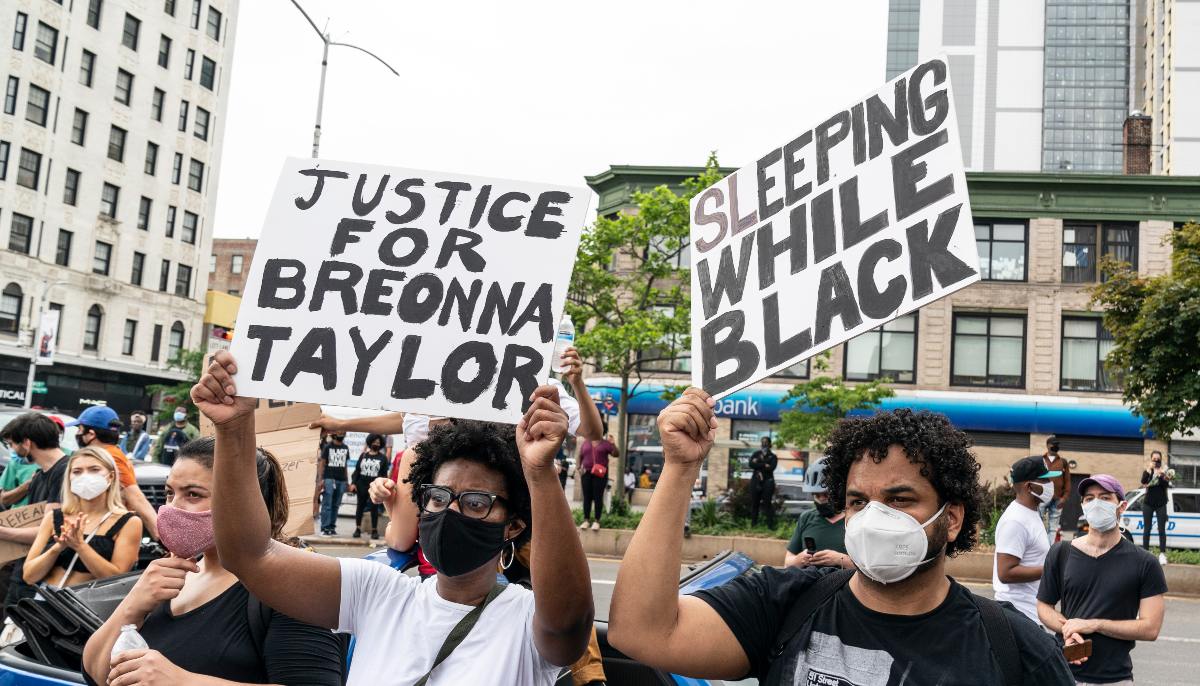Shutterstock
The Louisville cop involved in Breonna Taylor’s death and shot by her boyfriend has filed a civil suit against the man; plus, a massive earthquake in Turkey crumbles buildings, DST ends, Halloween blue moon brings lunacy?

Louisville Police Sgt. Jonathan Mattingly, who was shot during the law enforcement incident that led to the death of Breonna Taylor, has filed a civil suit against her boyfriend, Kenneth Walker, 26, for emotional distress, assault, and battery, CBS reports.
Mattingly was shot by Walker as he and two other officers entered Taylor’s apartment. The officers had a warrant and were attempting to carry out a drug investigation. Walker allegedly fired a shot that hit Mattingly in the leg. Walker, who is a licensed gun owner, claimed he thought the officers were intruders.
“Walker did intentionally shoot Mattingly or acted recklessly in firing his pistol in the direction of the Police Officers who were serving a search warrant,” the lawsuit states, NBC reported.
“Walker’s conduct in shooting Mattingly is outrageous, intolerable, and offends all accepted standards of decency and morality,” the lawsuit stated.
At least four people have been confirmed dead, after a magnitude 7.0 earthquake centered off Turkey’s Izmir province struck Friday afternoon local time, the US Geological Survey (USGS) said, CNN and the BBC reported.
According to reports, the temblor was felt on the Greek island of Crete, and as far away as Athens and Istanbul. Numerous early reports, photos and showed collapsed multi-story buildings and rescue teams searching through the rubble. At least 20 buildings have been recorded as collapsing so far.
Turkey and Greece both sit on fault lines, where earthquakes are common.
*This breaking news story was still developing at press time.
A “blue moon” is rare, and happens only every 2 1/2 to 3 years on average. Because of this, the term “Blue Moon” has come to be a phrase synonymous with a rarity.
According to The Old Farmers’ Almanac, the term “Blue Moon” really only took off during the 1980s, as a result of a mistake in a 1946 issue of Sky & Telescope magazine. The moon doesn’t really turn blue. Rather, the phrase refers to an event when two full moons occur within a single month.
In October 2020, the first full moon occurred on October 1. The second full moon occurs on Saturday, October 31.
The second full moon of October will be known as the Hunter’s Moon, which traditionally follows the “Harvest Moon,” which can either occur in October or November, according to The Old Farmers’ Almanac.
The earliest source of the name “Hunter’s Moon” comes from the Oxford English dictionary, used around 1710. Some Native American tribes called the October moon either the “Travel Moon” and the “Dying Grass Moon.”
Going back across the century, full moons have long been associated with weird behavior. Certainly, in the year 2020, we’ve seen more than a year’s worth of craziness. The rare blue moon of 2020, which also occurs on Halloween, has some people fearing the worst and concern the full moon will drive people to lunacy.
The word lunacy was born out of the ancient belief that the moon affected people’s behavior. The prefix “Luna” of words such as lunatic and lunacy are derived from the name of Roman goddess of the moon, Luna.
The belief that the full moon drives aberrant behavior is called the “lunar lunacy effect” or the “Transylvania effect.” The latter comes from an ancient belief that humans transformed into werewolves or vampires during a full moon, Scientific American reports.
At 2 AM on Sunday, November 1, it becomes time to “fall back,” by setting clocks one hour as Daylight Saving Time (DST) comes to an end.
The states of Arizona and Hawaii, as well as the Navajo nation, do not observe daylight saving time. In addition, the US territories of American Samoa, Guam, the Northern Mariana Islands, Puerto Rico and the U.S. Virgin Islands also do not observe daylight saving time.